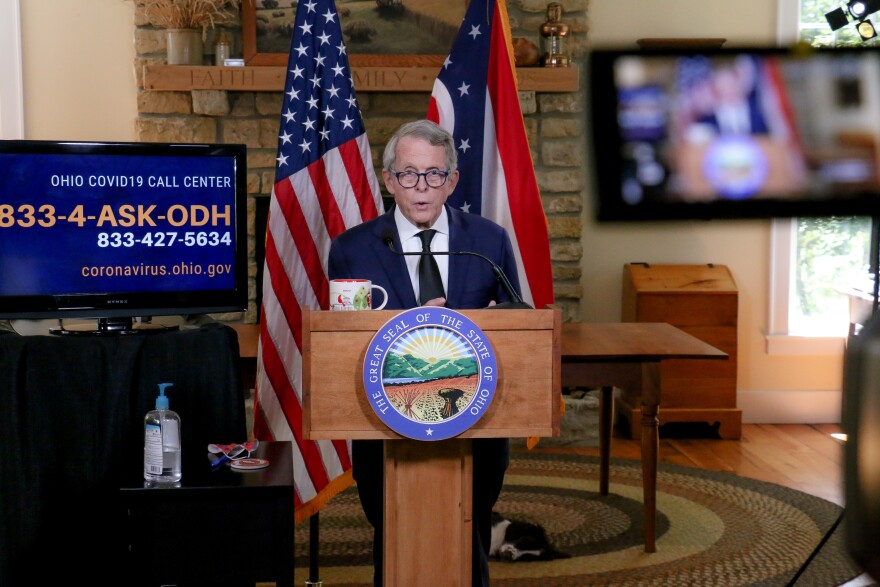Ohio’s 10 p.m. curfew could be shifted to 11 p.m. on Thursday, Gov. Mike DeWine announced at his Tuesday coronavirus briefing. The state will follow a new metric for determining the statewide curfew based on hospitalization rates, he said.
Under the plan, if the state has seven straight days of COVID hospitalizations below 3,500, the curfew could be changed to 11 p.m. for the following two weeks. If the numbers drop below 3,000 for seven consecutive days, the state could move the curfew to midnight. If they then drop further to below 2,500 for seven days in a row, the curfew could be lifted entirely.
“Hospital utilization across our state really is one of our most reliable indicators of how severe COVID is at that time. When people are sick enough with COVID to be in the hospital in high numbers, we know we are facing a very serious situation,” said Chief Medical Officer Dr. Bruce Vanderhoff. “As we consider easing our current curfew, it made sense to look at our daily report of concurrent hospital utilization by COVID patients.”
However, as hospitalizations are a lagging indicator, if COVID hospitalizations increase, a curfew may be reinstated quickly, Vanderhoff said.
With the announcement, DeWine issued a word of caution, especially as new strains of the virus have been identified in Ohio.
“The one thing we've learned about this virus is it's extremely unpredictable. We don't know where it's going to go,” he said. “We have to keep doing what we're doing.”
The Ohio Department of Health on Tuesday reported 4,262 new COVID-19 cases in the last 24 hours, for a total of 872,918 reported cases since the beginning of the pandemic.
Vaccine Rollout
The state is developing a central online vaccine scheduling option so that residents can register for vaccine appointments directly through a state webpage, the governor said. Currently, some vaccine provider locations are listed through the , but Ohioans have to contact the individual providers to find vaccination times and register. DeWine said the new website will be ready in a few weeks.
The governor explained a few ways in which the state is planning to increase vaccine doses going to older Ohioans. The state is finishing up vaccinating healthcare workers in group 1A, which frees up vaccines for residents in 1B who are 65 and older.
The federal government is allowing Ohio to start using vaccines originally reserved for congregate care settings, DeWine announced. Only about 45% of staff members in congregate care facilities have chosen to get the vaccine.
The state also plans to share guidance with vaccine providers on how to extract six doses from the Pfizer vaccine vials instead of the intended five doses. Vanderhoff said some providers have been able to extract six doses from the vials as much as 90% of the time.
DeWine said the state will take vaccines directly into affordable senior housing locations beginning February 8 to ease the burden of the vaccination process for seniors in underserved populations. Residents 65 years and older at those locations will be able to get the vaccine through on-site clinics.
“The threat of serious illness and death from COVID is high in affordable senior housing settings due to the age of the residents, the ease of spread in clustered housing complexes, the isolation of many residents who may not have access to information about how to get the vaccine and potential barriers to accessing the vaccine,” DeWine said.
The rolling vaccination of K-12 school personnel will begin Thursday with some schools in Cincinnati, DeWine said. That's earlier than the scheduled date of February 1. All schools will be notified of their February vaccination dates and vaccine providers by Friday of this week.
“We’re juggling, trying to get enough to [vaccinate school staff] at the same time that we’re trying to move forward on our older Ohioans,” DeWine said. “We’re trying to do two things at once. If we had more vaccine, we wouldn’t be juggling quite as much, but it is what it is.”
Copyright 2021 WYSO. To see more, visit . 9(MDA5NTM4MTIyMDE0MTg3NDc2MTVlZjdmNQ001))





